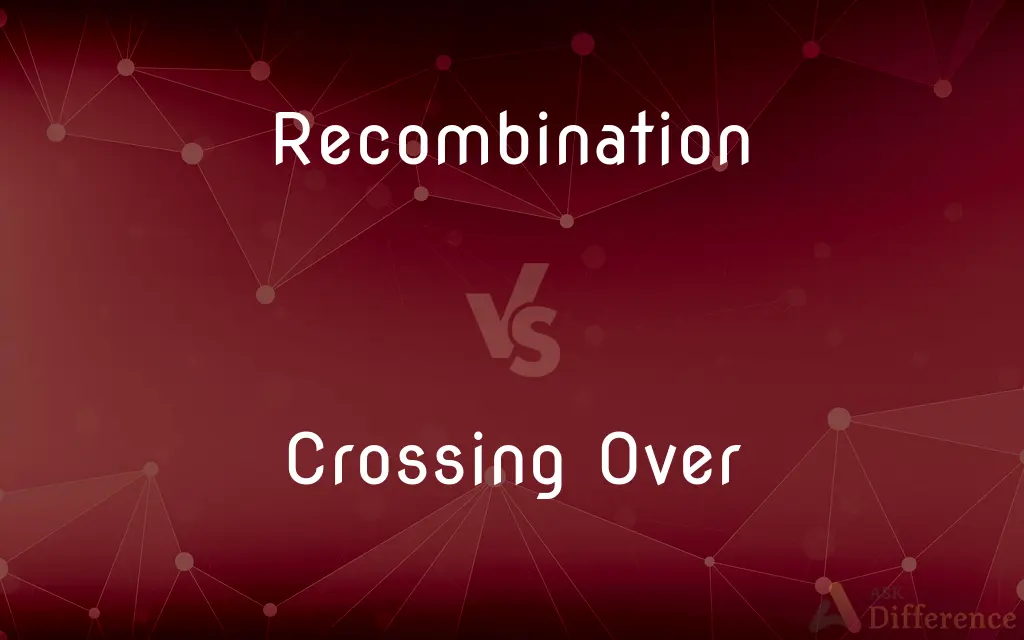Recombination vs. Crossing Over — What's the Difference?
By Tayyaba Rehman — Published on November 16, 2023
Recombination is the rearrangement of genetic material, while crossing over is a specific process where homologous chromosomes exchange genetic segments during meiosis.

Difference Between Recombination and Crossing Over
Table of Contents
ADVERTISEMENT
Key Differences
Recombination and crossing over both play pivotal roles in generating genetic diversity among organisms.
Recombination is a broad term that encompasses any event where DNA sequences are rearranged, either between DNA molecules or within one. In contrast, crossing over is a specific type of recombination that occurs during meiosis, when homologous chromosomes exchange genetic material.
Understanding the difference between these two terms can provide insights into genetics and evolution.
While recombination can occur in various ways, including during DNA repair or the integration of foreign DNA, crossing over is an event strictly associated with the production of gametes. It ensures genetic variability among offspring.
The implications of both processes are significant in the realm of genetics.
ADVERTISEMENT
Recombination can lead to new gene combinations, which might be beneficial, neutral, or deleterious to the organism. Meanwhile, crossing over ensures that no two gametes are genetically identical, paving the way for evolutionary processes driven by genetic variation.
In summary, while all instances of crossing over are a form of recombination, not all recombination events are crossing overs.
Comparison Chart
Definition
Rearrangement of genetic material
Exchange of genetic segments during meiosis between homologous chromosomes
Occurrence
Anywhere in the genome, anytime
Specifically during prophase I of meiosis
Resultant Genetic Diversity
Can be high, depends on the event
Always increases genetic diversity
Process Association
DNA repair, horizontal gene transfer, etc.
Meiotic cell division
Compare with Definitions
Recombination
The process of reshuffling genetic material.
Bacterial plasmid integration is a form of recombination.
Crossing Over
A meiotic recombination event between non-sister chromatids.
The crossing over rate can vary across different chromosomal regions.
Recombination
The natural or artificial genetic alteration process.
Scientists use recombination techniques in genetic engineering.
Crossing Over
An exchange of genetic segments between homologous chromosomes.
Crossing over during meiosis produces gametes with unique genetic combinations.
Recombination
Exchange or reshuffling of genetic segments between or within DNA molecules.
Viral genomes can undergo recombination, producing new viral strains.
Crossing Over
The physical breakage and reunion of homologous chromosome segments.
The chiasmata, visible under a microscope, indicate sites of crossing over.
Recombination
A molecular event leading to the rearrangement of DNA sequences.
Recombination during DNA repair ensures genome integrity.
Crossing Over
A mechanism that prevents the inheritance of linked genes always together.
Thanks to crossing over, genes on the same chromosome can be separated during inheritance.
Recombination
A second or subsequent time.
Crossing Over
The exchange of genetic material between homologous chromosomes that occurs during meiosis and contributes to genetic variability.
Recombination
(genetics) The formation of genetic combinations in offspring that are not present in the parents.
Recombination
(chemistry) The reverse of dissociation.
Recombination
(astrophysics) The process by which the plasma of electrons and protons produced after the Big Bang condensed into hydrogen, or the epoch in which this process occurred.
Cosmic microwave background
Recombination
Combination a second or additional time.
Recombination
(genetics) a combining of genes or characters different from what they were in the parents
Recombination
(physics) a combinng of charges or transfer of electrons in a gas that results in the neutralization of ions; important for ions arising from the passage of high-energy particles
Recombination
Any event altering the genetic material's configuration.
Recombination can lead to the emergence of new genetic traits.
Common Curiosities
Can recombination occur outside of meiosis?
Yes, recombination can occur during DNA repair, bacterial conjugation, and other processes.
Does recombination happen in all organisms?
Most organisms experience recombination, but the mechanisms and frequencies can vary.
How is crossing over detected?
Microscopically, as chiasmata during meiosis or inferred from genetic studies.
Are crossing over and recombination the same?
No, crossing over is a specific type of recombination that occurs during meiosis.
Can recombination introduce new genes into a genome?
Yes, recombination can introduce new genes, especially in processes like horizontal gene transfer in bacteria.
Are the effects of recombination always beneficial?
No, while recombination can introduce beneficial traits, it can also lead to harmful or neutral ones.
Why is crossing over important?
Crossing over increases genetic diversity in offspring, crucial for evolution and adaptability.
Does recombination change the total DNA amount in cells?
No, recombination rearranges genetic material but doesn't change the total DNA amount.
Are genes closer together on a chromosome more likely to be linked during crossing over?
Yes, genes closer together are less likely to be separated by crossing over, showing genetic linkage.
Is crossing over random?
While it's stochastic, certain chromosomal regions may undergo crossing over more frequently.
Does every cell undergoing meiosis experience crossing over?
While it's highly likely, it's not guaranteed for every single cell. However, it is a frequent and expected event.
How often does crossing over occur?
Typically, one to three crossovers occur per chromosome pair during meiosis.
What prevents excessive crossing over in cells?
Cellular mechanisms ensure controlled crossing over, preventing too many or too few events.
Can recombination repair DNA damage?
Yes, recombination is a key mechanism in the repair of certain types of DNA damage.
Share Your Discovery

Previous Comparison
Crimping Iron vs. Curling Iron
Next Comparison
Fundamental Particles vs. Elementary ParticlesAuthor Spotlight
Written by
Tayyaba RehmanTayyaba Rehman is a distinguished writer, currently serving as a primary contributor to askdifference.com. As a researcher in semantics and etymology, Tayyaba's passion for the complexity of languages and their distinctions has found a perfect home on the platform. Tayyaba delves into the intricacies of language, distinguishing between commonly confused words and phrases, thereby providing clarity for readers worldwide.













































